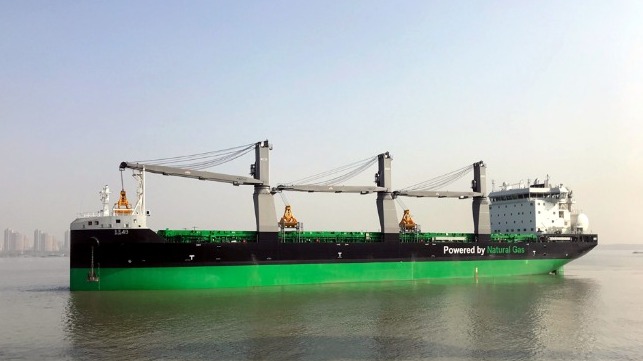Finland’s First Use of Renewable Liquefied Biogas for Marine Transport

For the first time, a Finnish shipping company has used only liquefied biogas as the fuel to power its marine transport. Totally renewable, the liquefied biogas reduces greenhouse gas emissions by up to 85 percent when compared to fossil fuel.
According to the announcement, the Viikki, a dry bulk carrier owned by ESL Shipping and operating in the Baltic, was fueled in Raahe, Finland with the biogas supplied by Gasum, a Nordic gas sector and energy market expert. The vessel was transporting iron ore for the Swedish steel company SSAB.
“This marks another milestone in our long continuum of sustainability-related investments and actions of recent years, said Mikki Koskinen, Managing Director of ESL Shipping. “ESL is committed to reducing emissions, and we believe that the ambitious targets set by our industry, 50% reduction in CO2 emissions by 2050, can only be reached by using a wide range of alternative fuels. We have been doing long-term environmental work together with SSAB for years and now we are taking a new, significant step towards fossil-free maritime transport.”
The wider deployment of biogas has been delayed by the relatively limited availability of biogas. There is also a cost factor to consider, but according to the announcement more and more companies are seeing the value of reducing emissions throughout their supply chains. SSAB is cited as a forerunner in these efforts aiming to bring fossil-free steel to the market by as early as 2026. The company's operations are scheduled to be fossil-free by 2045.
“Completely fossil-free operations require that fossil fuels have also been removed from transportation,” notes Harri Leppänen, Director, Environment and Safety at SSAB.
ESL Shipping noted that it has made significant investments to improve the energy efficiency and eco-friendliness of its fleet. The LNG-fueled newbuilding Viikki and its sister vessel Haaga, both delivered in 2018, are the eco-friendly dry bulk cargo vessels, built as part of the Bothnia Bulk project co-funded by the EU. The goal is to modernize the sea route between Luleå, Oxelösund and Raahe to be more eco-friendly and decrease environmental emissions in port with the improved availability of shore-side electricity.
